MercoPress. South Atlantic News Agency
Tag: Brazil economy
-
Friday, June 10th 2016 - 08:08 UTC
World Bank slashes global growth forecast to 2.4%, down from 2.9%

The World Bank has slashed its 2016 global growth forecast to 2.4% from the 2.9% estimated in January, due to stubbornly low commodity prices, sluggish demand in advanced economies, weak trade and diminishing capital flows.
-
Friday, June 3rd 2016 - 09:13 UTC
Temer's administration confident of congressional support for its economic plans
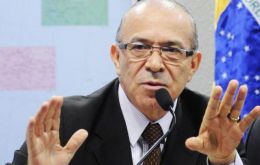
President Michel Temer's will press ahead with ambitious plans to balance the budget, reform pensions and draw private money into the energy sector despite the loss of two ministers to a corruption scandal, his chief of staff said on Thursday.
-
Thursday, June 2nd 2016 - 07:31 UTC
Brazil's economy plunges 5.4% in the first quarter compared to a year ago
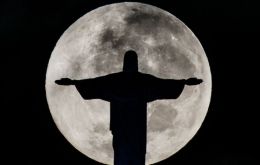
Brazil's economy sank further into recession in the first quarter, contracting 5.4% relative to the same three-month period of last year, the government said Wednesday. Compared with the final quarter of 2015, the economy shrank by 0.3%, according to the state-run Brazilian Institute for Geography and Statistics, or IBGE.
-
Tuesday, May 31st 2016 - 07:21 UTC
Brazil's posts a primary budget surplus in April, because of annual income tax collection
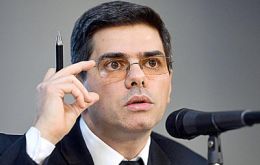
The Brazilian government posted a primary budget surplus in April well above market expectations due to a seasonal increase in tax revenues and a drop in subsidies, a senior official said on Monday. The government, which is struggling to lift the economy out of a deep recession, posted a primary budget surplus of 9.751 billion reais (US$2.72 billion) in April.
-
Wednesday, May 25th 2016 - 05:58 UTC
Temer announces tough austerity measures but needs to show Congress supports him
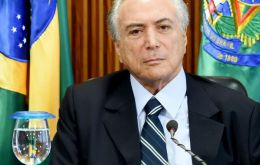
Brazil's interim president announced austerity measures on Tuesday aimed at pulling Latin America's largest economy from its worst crisis in decades, warning that a failure to act would sentence future generations to “extraordinary hardship.” Speaking with government leaders in a national televised meeting, interim president Michel Temer, 75, also banged his hand on the table while insisting he was up to the job.
-
Thursday, May 19th 2016 - 11:57 UTC
Meirelles unveils a dark picture of Brazil's finances and insists of pensions reform
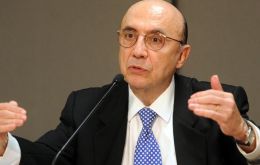
Brazil's fiscal deficit prior to debt interest payments could reach 150 billion Reais (US$42.10 billion) this year as revenues collapse amid a crippling recession economy, Finance Minister Henrique Meirelles warned on Wednesday. The deficit includes eventual losses from state electricity holding Eletrobras.
-
Tuesday, May 3rd 2016 - 06:54 UTC
Brazil recession deepens, but prospects for 2017 seem much brighter
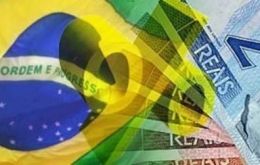
Brazil’s recession is expected to deepen this year as economists brace for an even steeper contraction than in 2015. Economists have downgraded their 2016 outlook for Latin America’s largest economy for the 15th week in a row, according to the weekly Focus survey of about 100 economists by the Brazilian central bank.
-
Friday, April 29th 2016 - 06:18 UTC
Latam and Caribbean forecasted to contract 0.5% in 2016, worst two-year since 1982, says IMF
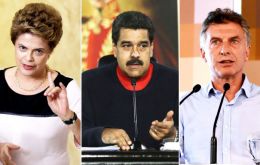
Latin America and the Caribbean will post an overall 0.5% economic contraction in 2016, the International Monetary Fund forecast in its latest report, capping the region's worst two-year period since the 1982 debt crisis. But the IMF said the region is expected to rebound to 1.5% growth in 2017, avoiding the “lost decade” phenomenon that marked the 1980s.
-
Tuesday, April 19th 2016 - 00:44 UTC
Brazil's steep recession forecasted to continue in 2017 as economic pessimism deepens
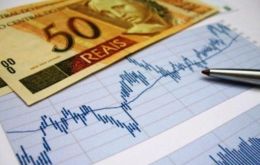
As the political battle to remove president Dilma Rousseff rages on, with both sides seeming to ignore the necessary confidence and certainty for normal business, economists are becoming increasingly pessimistic about Brazil's economic outlook.
-
Friday, April 8th 2016 - 09:25 UTC
Brazil's model of 'national production' is over: a Mercosur open to the world a solution
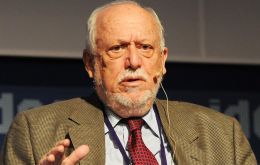
Brazil exhausted its economic model, the domestic market is no longer enough and Brazilian protectionism hindered competitiveness and scared foreign investment, claimed retired Brazilian diplomat Jose Botafogo at the international symposium “The future of Mercosur” organized in Paraguay as part of the 25th anniversary celebration of the South American block.
